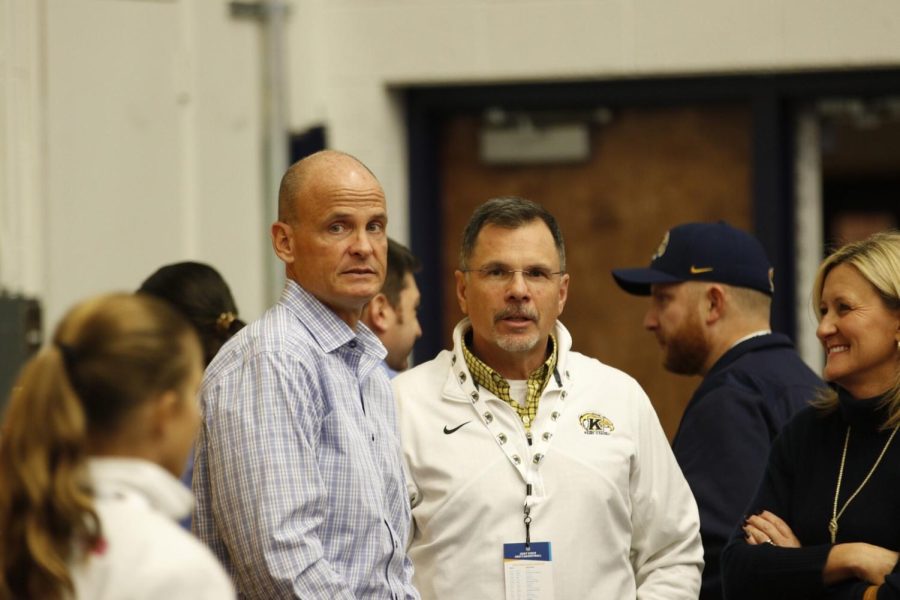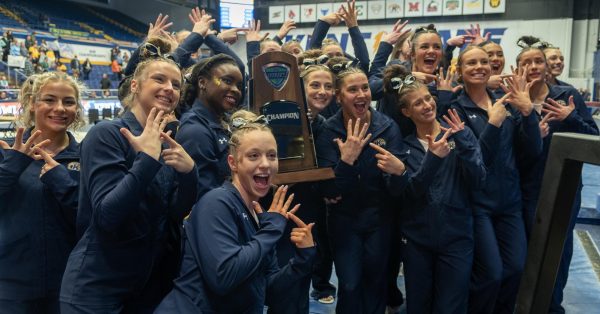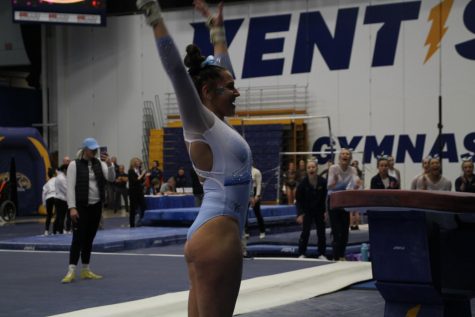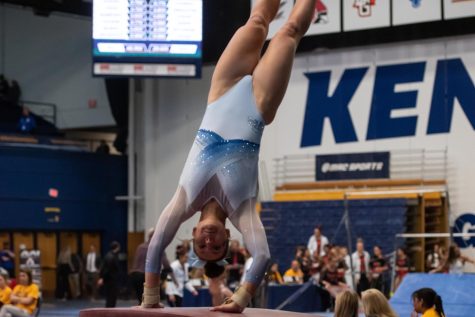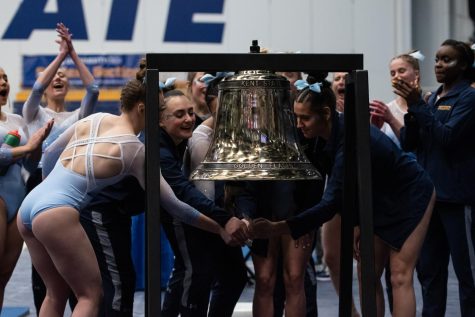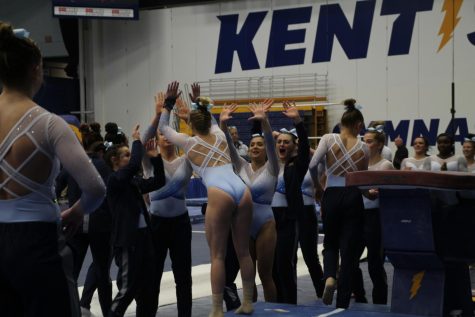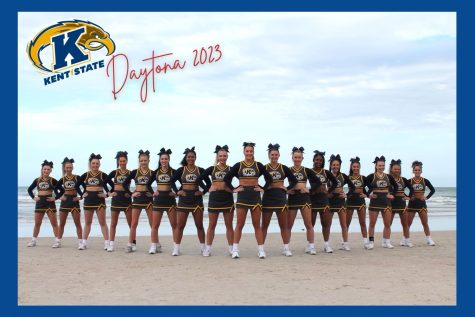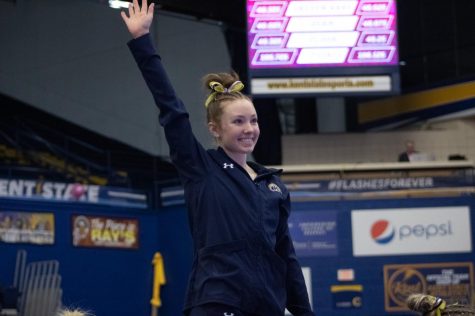Delays, lack of action in Title IX investigation lead to female employee’s departure
November 6, 2019
The unwanted notes of affection in the shape of little cut-out notes, direct messages on Facebook and pieces of candy left on and inside Lyndsey Maurer’s desk in the Memorial Athletic and Convocation Center (MACC) or on top of her car, started in March 2015.
The married co-worker who wrote the notes and left the candy, Colin Miller, the senior fiscal manager of athletics, also used his master key to enter Maurer’s office without her knowledge or permission.
Maurer filed an official Title IX complaint with Kent State’s Office of Compliance, Equal Opportunity and Affirmative Action in September 2015. An examination of the documents related to Maurer’s complaint, along with interviews with Maurer and her co-workers, show a string of delays on the part of university administrators and officials in the athletics department in moving the complaint forward and dealing with the recommended disciplinary actions for Miller. It also shows a reluctance among university officials to deal with disconcerting behavior from Miller.
The handling of Maurer’s case is an example of “the damaged culture” in the athletics department, according to a group of Kent State athletics supporters who are actively campaigning to oust Director of Athletics Joel Nielsen.
It also provides a rare window into how Kent State investigated a claim of sexual harassment, a process that is normally shielded from the public eye by the confidentiality guarantees of Title IX of the Education Amendments Act of 1972. It is intended to prohibit discrimination on the basis of sex in any education program or activity that is federally funded.
Some details surrounding Maurer’s Title IX case became part of the court record in Lauren Kesterson’s Title IX lawsuit against Kent State. It was presented as a second example, along with Kesterson’s, of how the university “has a custom, policy, or practice of coddling perpetrators of sexual harassment.”
Maurer, who had to continue working with Miller, said she felt abandoned and unsupported through the months it took the university to deal with her complaint. Ultimately, the difficulty of the situation drove her to leave her job as the director of athletic communications in March 2016.
Miller continued working in the department until September 2018.
CARDS AND CANDY
Maurer reached out initially to Erin Barton, the Affirmative Action and deputy Title IX coordinator, about the situation with Miller.
“She said she wanted to help,” Maurer said. “And then she never got back to me. A couple of weeks or a month went by, and then I got back in touch with her and was like ‘Hey, I’m still sitting here waiting on you.’ And she was like ‘oh sorry, some other things were going on.’ And then she basically told me I needed to confront Colin on my own.”
Maurer sent Miller an email on April 23, 2015, telling him “the notes, candy, etc. has to stop. It’s making me feel very uncomfortable, especially the fact that you are using your master key to enter our offices that are locked.” Miller responded, “I am sorry that I made you feel that way.” He says he never meant to make Maurer uncomfortable and that he will be “totally professional from now on. I never met (sic) to make you feel uncomfortable…Totally professional from now on.”
After that, Maurer and Barton exchanged emails and voicemails. In an email from April 28, 2015, Maurer acknowledges a voicemail from Barton, but asks, “if you speak to Joel, would you have to tell him it’s coming from me? Or keep it vague and just say [Miller] is using his key to get into someone’s office, etc.”
On May 13, 2015, Barton said she left “a couple of messages” for Maurer and that she wanted to follow up with Nielsen and “get this resolved for you.” She encouraged Maurer to follow up and let her know “which option” she wanted to pursue. Maurer responded: “Don’t worry about it, Erin. Thanks for your help.”
On May 19, 2015, Barton followed up. “Joel seemed eager to assist and I did leave your name out of the conversation, as you requested,” she said. Barton urged Maurer to “keep me posted if anything changes and you would like any assistance.”
For four months after Maurer’s email to Miller, the notes and candy stopped. On June 9, Miller said Maurer’s email from April “hurt me VERY much.” During the week of Aug. 27, 2015, another note and some candy were left in Maurer’s office. The note read “I miss your smile.”
Maurer received a letter Sept. 14 from Pamela Fitzgerald, manager & interim Title IX coordinator, that said, as a result of Maurer’s request that “interim action” be taken against Miller, that a no contact order was issued for them both. During the investigation, “any communication regarding budget or work related matters” with Miller should go through Janet Kittell, Maurer’s supervisor and the deputy director for internal operations and senior woman administrator in athletics.
On Sept. 15, 2015, Maurer filed a complaint with Kent State’s Office of Equal Opportunity and Affirmative Action (EOAA).
THE REPORT
Ninety-four days after Maurer filed her complaint, the EOAA issued its findings on Dec. 18, 2015. The university policy register states an investigation should be completed within 60 days and if an extension is needed, the parties will be notified in writing. Maurer was never notified.
“I emailed them and emailed them and emailed them and asked them for updates and why hasn’t this been done yet? What is going on?” she said. “I actually pointed out to them in an email saying, I learned in training that these take 60 days and it was over the 60 days,” Maurer said.
The report came out at the end of fall semester, three days before the university’s winter break began.
“It is clear from Ms. Maurer’s complaint, emails and social media posts between the two parties and the interviews conducted,” the report states, “that Mr. Miller’s repeated behavior was inappropriate, unacceptable and created a hostile (sic) and offensive work environment and interfered with her employment to the point where she avoids the common areas where she works and any interaction with him because she feels uncomfortable.”
The investigation did not find his actions to be “severe,” but that his behavior and conduct were “pervasive or persistent” and that he violated the university’s policy related to gender and sexual harassment.
The relationship was one-sided, the report said, with Miller as the pursuer, but Miller’s perception was that it was a two-way relationship and “it was a game between both of them.”
In one example from the report, Miller gave Maurer a note that said he wouldn’t bother her anymore but that “just because we don’t talk doesn’t mean I don’t think about you. I’m just trying to distance myself because I can’t have you.” A cut out in the note said, “you and I will always be unfinished business.”
When contacted by The Kent Stater on Oct. 21, 2019, Miller said “what happened was not what is written. But I have nothing to prove that it wasn’t.” He declined any further comment.
Mollie Radzinski, an assistant sports information director at the time who reported directly to Maurer, said the harassment went beyond the candy and notes, and that Miller regularly made them feel uneasy.
“If you’re standing on the upper balcony [in the MAC Center] you could look through [the] windows down into our office, and directly into Lyndsey’s office if her door was open,” Radzinski said. “We would see him standing there, looking down all the time. So we put computer paper up to cover the windows.” Radzinski said candy was also left on her desk, but she doesn’t know by whom.
The windows are now covered with Kent State Golden Flashes decals, ““I paid for window decals so he couldn’t see in my office windows anymore,” Maurer said.
Kittell said four or five other women in addition to Maurer complained to her about Miller.
“It was always single, attractive women,” she said. “Everybody in the department knew about it.” She told Nielsen about the complaints within “the first six weeks” after she started working at Kent State. She told him Miller was hanging out in the gymnastics room too much, “leering” at the athletes and that it was making people who uncomfortable.
“He told me ‘well, have Brice [Biggin] handle it,” Kittell said. Biggin is the head gymnastics coach. “And I talked to Brice about it, and Brice was reluctant, and actually would not do it, because Colin had control of the budget and was known to be, let’s say, less than even handed if you weren’t a favorite.”
Kittell was not interviewed as part of the Maurer investigation, despite being the highest-ranking woman in the department and Maurer’s direct supervisor.
Katie Schilling, the compliance coordinator in the athletics department at the time, stated in the report she had “personally witnessed Mr. Miller looking and positioning himself behind female athletes to look at their bodies or butts,” Schilling said. “It’s a running joke in Athletics that if you can’t find Mr. Miller, look in gymnastics and you’ll find him there.”
A business analyst in the department, Elizabeth Lott, stated in the report Miller made comments to her such as, “Ima get her” or “Ima corner her,” in reference to Maurer. Lott echoed Schilling’s statement about Miller watching the gymnastics practices, again calling it a “running joke” in the department.
Four of the six people interviewed for the investigation said the relationship between Maurer and Miller was one sided, with Miller pursuing Maurer. Two said otherwise: Miller and Biggin. Biggin and Miller went to high school together and were friends, the report stated. Biggin stated Miller told him about the “situation” between Miller and Maurer and indicated it was a two-way relationship.
The Kent Stater and KentWired requested an interview with Nielsen in reference to Maurer’s complaint and was told Nielsen was not answering any questions related to the effort to oust him or the Colin Miller sexual harassment investigation.
The Kent Stater then reached out to Eric Mansfield, the executive director of university media relations. He emailed a statement that said “this matter has been investigated by the appropriate department following university policy and is now closed.”
Mansfield followed this statement with another email that said, “If you have additional interview or info requests related to this story, please start with my office to ensure a timely response.”
The communication from The Kent Stater and KentWired included detailed references to several of the issues raised during the reporting of this story. The university’s response remained the same.
THE REPORT’S RECOMMENDATIONS
The EOAA report recommended the following actions be taken:
• That Miller complete a 10-day unpaid suspension.
• That he sign a “last chance agreement” in lieu of termination, which granted him “a chance to demonstrate his ability to be a successful employee.” Violating the terms of the agreement were cause for termination.
• That Miller’s office be relocated outside of the MACC.
• That his master key be taken away.
• That he attend counseling sessions through the university’s employee assistance program.
• That the no contact order, originally issued in September, be maintained for both parties.
After the report came out, Maurer sent a letter Jan. 7 to Fitzgerald and questioned how the people for the report were chosen, given that:
-
Four people she recommended as witnesses were not interviewed.
-
Two people she said spoke to Karen Watson in human resources about “the ongoing harassment” did not appear in the report.
-
Kittell, her supervisor, “advised [Fitzgerald] to speak to most, if not all, of the single women in the athletic department.” None appear in the report.
Miller appealed the report’s findings. Email records show there was a delay in responding to him about his deadline for the appeal. He was ultimately given a deadline of Jan. 27, 2016, a week past the normal 15 business days allowed. The extension is attributed to the scheduled winter break and the Martin Luther King Jr. holiday. He also requested a 10-day extension, but was granted only five. He filed his appeal on Feb. 2, 2016.
Miller said in the appeal, “the whole case against me is a fraud,” but confirmed he started leaving Maurer notes sometime after “late February 2014.” He said her “office was unlocked and the door was open.” Maurer, he said, “never once over the 12 months did she say ‘stop doing that.’” Maurer visited Lott’s office three to five times each week, where the chance of seeing him was very high, he states, since her office is “20 feet from my desk.”
Miller stated he decided in March 2015 “the relationship needed to stop,” so he stopped talking to Maurer, but she continued to come up to “(Lott’s) office regularly for a couple of weeks.” Any business Maurer needs to conduct with Lott, he stated, “can be done over the phone or (Lott) can go to Lyndsey’s office.”
He stated Maurer “got mad at me when I stopped paying attention to her around the end of March 2015.” He also stated the investigation was “very one-sided and nothing but a witch hunt.”
Miller acknowledged putting candy on Maurer’s desk in August 2015, after she asked him to stop, and that “a simple ‘don’t do that again’ from her would have worked.” He left her the candy only because “she was being flirty again.”
He accused Kittell of being behind the complaint. In his appeal, he said Kittell “told people I harass women.” He stated “(Kittell) is in the middle of this, remember (Maurer) works for (Kittell).”
AFTER THE APPEAL
The appeal was reviewed by Bonita Prewitt, the gender equity compliance officer and Title IX coordinator for the EOAA, who took into account the previous EOAA investigation as well as additional documentation provided by Miller. Her findings, issued Feb. 29, 2016, upheld the EOAA investigation from December 2015. The report demands Miller’s “supervisor or appointing authority” provide the EOAA with a written update by March 7, 2016, “regarding what actions will be taken as a result of the findings” from the December report, with “a timeline for implementation of those actions.”
The same week, on March 2, 2016, Kittell emailed Prewitt about Miller’s continuing presence in the MAC Center. “He is still here every day and this morning up and down the hallways,” her email said. Prewitt responded that Miller was not “banned” from the MACC and that there were a number of recommendations made, including the no-contact order, and that any violation of the order should be relayed to Jeannie Reifsnyder, the senior associate vice president for finance and administration, and Miller’s supervisor from the finance department.
Kittell said she was “in a very uncomfortable situation as I try to support those who continue to work in a hostile environment.” Prewitt said anyone who felt they were subjected to a hostile environment should contact her office.
On March 9, 2016, two days later than Prewitt’s report requested it, Reifsnyder updated her on the steps taken to comply with the report. She confirmed Miller’s office was relocated to the Schwartz Center on Feb. 19, 2016, and that his master key was turned in Jan. 27, 2016.
Maurer said Miller still came over and worked in his old office in the MACC. “It almost made it worse, not knowing when he was going to be in the building,” Maurer said.“It was almost harder, not knowing when he was going to be around the corner.”
A LAST CHANCE
Reifsnyder told Prewitt in her update she “anticipated Miller’s last chance agreement would be completed by March 23, 2016.”
Instead, Miller signed the last chance agreement April 8, 2016—more than a month after his appeal was denied. He was referred to Impact Solutions, Kent State’s employee assistance program, the same day.
Miller began taking the 10 unpaid suspension days April 29, 2016, more than seven months after Maurer filed her complaint with the EOAA and more than a month after she left the university in early March. The days Miller took off included April 29, May 6, May 13, May 20, May 23 to May 27 and June 3. Five of the dates were singular Fridays.
Reifsnyder noted in her report to Prewitt that because of “the small size of the athletic business office, the timing of the suspension will need to be planned to allow adequate support for the budget preparation and year- end reconciliation but will occur prior to the end of the fiscal year” that ended June 30, 2016.
Maurer said Miller was still sending her emails in 2016, despite the no-contact order that remained in place. The emails are dated Feb. 1, Feb. 9 and Feb. 15, 2016—Nielsen and Kittell are copied on all of them. Maurer emailed Courtney Calhoun, the director of compliance and affirmative action, on Feb. 9 and again on Feb. 15 about the emails from Miller. She asked in the second email,
“What is the point of having the no-contact order if he has shown blatant disregard to it?”
He answers his office is in the process of reviewing her concerns and “working to ensure that the safety and well-being of our faculty, staff and students is protected.” He also says Maurer would be contacted “immediately once we have completed the investigation into your concerns” and notes they are still evaluating Miller’s appeal.
THE END
Maurer said she felt so uncomfortable and unhappy at Kent State she started looking for a new job. She scheduled a meeting with Nielsen and met with him in his office. Maurer told him about the new job interviews and her reasons for wanting to leave. She didn’t want to go, she told him, but the situation with Miller was getting too difficult.
“I’ll never forget it,” Maurer said. “The advice he offered me during that meeting was that I just had to figure out a way to work with Colin. And if I didn’t like it I should leave. He told me that is the same advice he would give any of his daughters.”
Miller remained with Kent State until Sept. 21, 2018, when the university ended his employment. In his employment file, obtained through a public records request, there is no cause recorded for the dismissal, but Miller was eligible for unemployment, which means he did not resign.
Maurer quit her position at the university in early March 2016. She said after she left the university, “I haven’t been in athletics since …. It’s something I probably won’t get back into, ever.”


